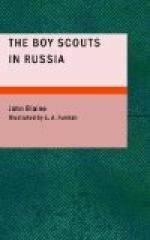Fred went over and looked at him. Then, idly, indifferently, he went to the horse, which was standing perfectly still, though its flanks were still heaving. Fred patted the horse’s head. Schmidt glanced around at him. His back was turned, and he seemed to see nothing worthy of attention in Fred’s attitude.
And then, with one spring, Fred was on the horse’s back, and, bending low, was urging the tired animal back over the road he had travelled so slowly. With a cry of mingled rage and surprise Schmidt leaped up and began shouting. But the horse, ready enough to obey when it was running riderless away, now obeyed the more convincing orders of its rider. Fred, moreover, was a welcome contrast to Schmidt’s big bulk; there was a difference of at least seventy pounds.
Fred turned once to look at Schmidt, and saw him staring with an expression of stupefaction at the empty holster. Then he devoted himself entirely to the road ahead. It was as he had thought and hoped; Schmidt did not have another pistol. And, with Fred urging him on, the horse galloped on as if it had been really fresh.
“Thank heaven he’s stupid, that Schmidt!” thought Fred.
Then he had a fit of remorse. He was afraid that it would go hard with Schmidt, for he knew that in the German army excuses are not readily accepted. However, it was not a time to think of sentiment. Fred was taking desperate chances himself, and it had been a case of seizing any chance of escape that offered itself. Not only his own liberty, but very probably his own life had depended upon his getting away. He knew enough, by this time, to understand that the outcome of the first campaign of the war might depend upon the accuracy of the information the Russians obtained of the German movements.
It was plain to Fred that the Russians, in this quarter at least, had not been well served by their spies. He was surprised at the absence of initiative the Russians had shown in some ways. Aeroplane scouting, for instance, would have made it impossible for the Germans to spring such a surprise as evidently was in preparation. The Germans were using their aerial scouts. It was one of them, detecting the approach of General Suvaroff and his Cossack raiders, who had spoiled the plan for the capture of von Hindenburg.
But though he had felt that he was perfectly justified in sacrificing Schmidt to his own need to escape, Fred could not help feeling sorry for the poor fellow.
“I hope he’ll be able to think up a good story!” he said to himself. “And, by George, I hope I don’t meet any more German soldiers! They would certainly finish me off if they found me riding on a German horse! There isn’t anything I could do that would make them think that was all right, no matter how stupid they were!”
He urged his horse on now as hard as he dared, tired though he knew it to be. His plan was simple enough. He meant to ride to within a mile of the village, and then dismount, letting the horse go wherever it liked. Its usefulness to him would be over as soon as it had put him past the possibility of pursuit. He thought his troubles were nearly over. But suddenly, around a turn in the road, came a glare of light, and in his ears sounded the bugle of a German military automobile.




